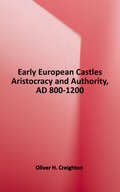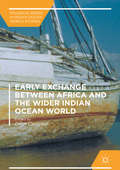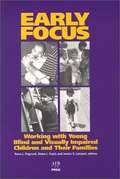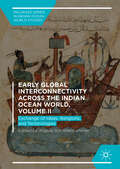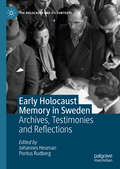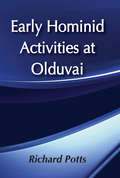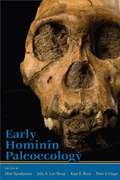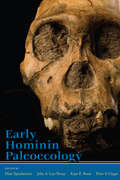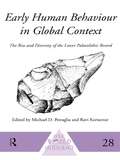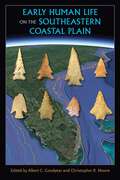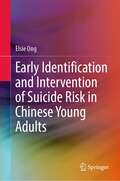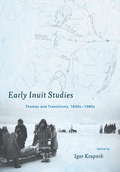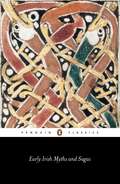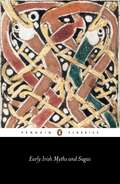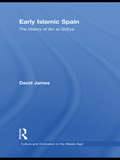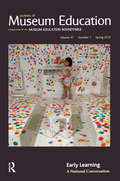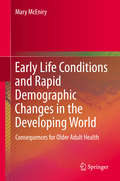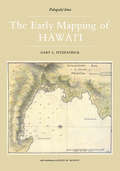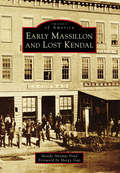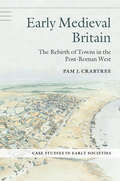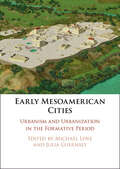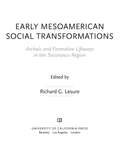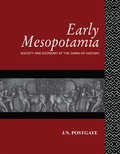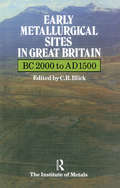- Table View
- List View
Early European Castles: Aristocracy and Authority, AD 800-1200 (Debates In Archaeology Ser.)
by Oliver H. CreightonMedieval castles were, alongside the great cathedrals, the most recognizable buildings of the medieval world. Closely associated with concepts of justice, lordship, and authority as well as military might, castles came to encapsulate the period's very essence. Looking at above and below-ground evidence and examining a wide variety of sites - from towering donjons to earth and timber castles - in different parts of western Europe, this book explores the relationship between early castle building and the emergence of a new aristocracy and investigates the impact of authority on the organisation of the landscape. A particular focus is on the social context of early private fortifications: Europe's earliest castles came to embody a new and radically different form of power - an aristocratic authority that was highly personal in nature, glaringly visible in its presence, and enforceable through violence, both threatened and real. The volume reassesses traditional models of castle origins; examines aspects of elite lifestyle in and around these structures, including pastimes and diet; considers medieval visual experiences of sites and their settings; and explores some future directions for research.
Early Exchange between Africa and the Wider Indian Ocean World (Palgrave Series in Indian Ocean World Studies)
by Gwyn CampbellThis volume comprises a selection of essays by scholars from a variety of disciplines that discuss the exchange relationship between Africa and the wider Indian Ocean world (IOW), a macro-region running from East Africa to China, from early times to about 1300 CE. The rationale for regarding this macro-region as a “world” is the central significance of the monsoon system which facilitated the early emergence of long-distance trans-IOW maritime exchange of commodities, peoples, plants, animals, technologies and ideas.
Early Focus: Working With Young Blind or Visually Impaired Children and Their Families
by Jessica S. Lambert Diane L. Fazzi Rona L. PogrundStressing the importance of early intervention in working with children with visual impairment, Pogrund (formerly special education, California State U.) and Fazzi (special education, California State U.) offer practitioners (teachers and other specialized professionals) an edited guide to working with children under age five. Eleven chapters review the developmental areas that are likely to be affected by vision loss and discuss the theory and knowledge base behind suggested educational practices in these areas. Chapters cover working with families, medical and functional implications, cognitive development, literacy, social development, promotion of independence and daily living skills, behavioral supports, motor and mobility development, and working with other professionals. Annotation (c)2003 Book News, Inc., Portland, OR (booknews.com)
Early Global Interconnectivity across the Indian Ocean World, Volume II: Exchange of Ideas, Religions, and Technologies (Palgrave Series in Indian Ocean World Studies)
by Angela SchottenhammerThis volume investigates the emergence and spread of maritime commerce and interconnectivity across the Indian Ocean World—the world’s first “global economy”—from a longue durée perspective. Spanning from antiquity to the nineteenth century, these essays move beyond the usual focus on geographical sub-regions or thematic aspects to foreground inter- and trans-regional connections. Focusing on the role of religion in the expansion of commerce and exchange across the region, as well as on technology and knowledge transfer, volume II covers shipbuilding and navigation technologies, porcelain production, medicinal knowledge, and mules as a commodity and means of transportation.
Early Holocaust Memory in Sweden: Archives, Testimonies and Reflections (The Holocaust and its Contexts)
by Pontus Rudberg Johannes HeumanThis book investigates the memory of the Holocaust in Sweden and concentrates on early initiatives to document and disseminate information about the genocide during the late 1940s until the early 1960s. As the first collection of testimonies and efforts to acknowledge the Holocaust contributed to historical research, judicial processes, public discussion, and commemorations in the universalistic Swedish welfare state, the chapters analyse how and in what ways the memory of the Holocaust began to take shape, showing the challenges and opportunities that were faced in addressing the traumatic experiences of a minority. In Sweden, the Jewish trauma could be linked to positive rescue actions instead of disturbing politics of collaboration, suggesting that the Holocaust memory was less controversial than in several European nations following the war. This book seeks to understand how and in what ways the memory of the Holocaust began to take shape in the developing Swedish welfare state and emphasises the role of transnational Jewish networks for the developing Holocaust memory in Sweden.
Early Hominid Activities at Olduvai: Foundations of Human Behaviour
by Richard PottsThe earliest sites at Olduvai Gorge in Tanzania are among the best documented and most important for studies of human evolution. This book investigates the behavior of hominids at Olduvai using data of stone tools and animal bones, as well as the results of work in taphonomy (how animals become fossils), the behavior of mammals, and a wide range of ecological theory and data. By illustrating the ways in which modern and prehistoric evidence is used in making interpretations, the author guides the reader through the geological, ecological, and archeological areas involved in the study of humans.Based on his study of the Olduvai excavations, animal life, and stone tools, the author carefully examines conventional views and proposals about the early Olduvai sites. First, the evidence of site geology, tool cut marks, and other clues to the formation of the Olduvai sites are explored. On this basis, the large mammal communities in which early hominids lived are investigated, using methods which compare sites produced mainly by hominids with others made by carnivores. Questions about hominid hunting, scavenging, and the importance of eating meat are then scrutinized. The leading alternative positions on each issue are discussed, providing a basis for understanding some of the most contentious debates in paleo-anthropology today.The dominant interpretive model for the artifact and bone accumulations at Olduvai and other Plio-Pleistocene sites has been that they represent home bases, social foci similar to the campsites of hunter-gatherers. Based on paleo-ecological evidence and ecological models, the author critically analyzes the home base interpretation and proposes alternative views. A new view of the Olduvai sites - that they represent stone caches where hominids processed carcasses for food - is shown to have important implications for our understanding of hominid social behavior and evolution.
Early Hominin Paleoecology
by Julia A. Lee-Thorp Kaye E. Reed Matthew Sponhiemer Peter UngarAn introduction to the multidisciplinary field of hominin paleoecology for advanced undergraduate students and beginning graduate students, Early Hominin Paleoecology offers an up?to?date review of the relevant literature, exploring new research and synthesizing old and new ideas.Recent advances in the field and the laboratory are not only improving our understanding of human evolution but are also transforming it. Given the increasing specialization of the individual fields of study in hominin paleontology, communicating research results and data is difficult, especially to a broad audience of graduate students, advanced undergraduates, and the interested public. Early Hominin Paleoecology provides a good working knowledge of the subject while also presenting a solid grounding in the sundry ways this knowledge has been constructed. The book is divided into three sections--climate and environment (with a particular focus on the latter), adaptation and behavior, and modern analogs and models--and features contributors from various fields of study, including archaeology, primatology, paleoclimatology, sedimentology, and geochemistry.Early Hominin Paleoecology is an accessible entrée into this fascinating and ever-evolving field and will be essential to any student interested in pursuing research in human paleoecology.
Early Hominin Paleoecology
by Kaye E. Reed Peter Ungar Matt Sponheimer Julia A. Lee-ThorpAn introduction to the multidisciplinary field of hominin paleoecology for advanced undergraduate students and beginning graduate students, Early Hominin Paleoecology offers an up-to-date review of the relevant literature, exploring new research and synthesizing old and new ideas. Recent advances in the field and the laboratory are not only improving our understanding of human evolution but are also transforming it. Given the increasing specialization of the individual fields of study in hominin paleontology, communicating research results and data is difficult, especially to a broad audience of graduate students, advanced undergraduates, and the interested public. Early Hominin Paleoecology provides a good working knowledge of the subject while also presenting a solid grounding in the sundry ways this knowledge has been constructed. The book is divided into three sections—climate and environment (with a particular focus on the latter), adaptation and behavior, and modern analogs and models—and features contributors from various fields of study, including archaeology, primatology, paleoclimatology, sedimentology, and geochemistry. Early Hominin Paleoecology is an accessible introduction into this fascinating and ever-evolving field and will be essential to any student interested in pursuing research in human paleoecology. Additional Contributors: David Braun Beth Christensen David J. Daegling Crag Feibel Fred E. Grine Clifford Jolly Naomi E. Levin Mark A. Maslin John Mitani Jay Quade Amy L. Rector Jeanne Sept Lillian M. Spencer Mark Teaford Carol V. Ward Katy E. Wilson
Early Human Behaviour in Global Context: The Rise and Diversity of the Lower Palaeolithic Record (One World Archaeology)
by Michael D. Petraglia Ravi KorisettarEarly Human Behaviour in a Global Context will be of use to students and professionals who are interested in prehistory, Paleolithic archaeology, and paleoanthropology. Those interested in our ancestors and their place in the natural world will also benefit from the information presented in this book. Chapters focus on: * the nature of archaeological evidence * stone tool technology * subsistence practices * settlement distributions.
Early Human Life on the Southeastern Coastal Plain (Florida Museum of Natural History: Ripley P. Bullen Series)
by Albert C. Goodyear and Christopher R. MooreBringing together major archaeological research projects from Virginia to Alabama, this volume explores the rich prehistory of the Southeastern Coastal Plain. Contributors consider how the region’s warm weather, abundant water, and geography have long been optimal for the habitation of people beginning 50,000 years ago. They highlight demographic changes and cultural connections across this wide span of time and space. New data are provided here for many sites, including evidence for human settlement before the Clovis period at the famous Topper site in South Carolina. Contributors track the progression of sea level rise that gradually submerged shorelines and landscapes, and they discuss the possibility of a comet collision that triggered the Younger Dryas cold reversion and contributed to the extinction of Pleistocene megafauna like mastodons and mammoths. Essays also examine the various stone materials used by prehistoric foragers, the location of chert quarries, and the details stone tools reveal about social interaction and mobility. This volume synthesizes more than fifty years of research and addresses many of today’s controversial questions in the archaeology of the early Southeast, such as the sudden demise of the Clovis technoculture and the recognition of the mysterious "Middle Paleoindian" period. Contributors: Robert J. Austin | Mark J. Brooks |Christopher R. Moore | I. Randolph Daniel, Jr. | Joseph E. Wilkinson | Joseph Schuldenrein | Allen West | David K. Thulman | James K. Feathers | Terry E. Barbour II | Douglas Sain | Thomas A. Jennings | Albert C. Goodyear | Andrew H. Ivester | Dr. Malcolm A. LeCompte | Adam M. Burke | James S. Dunbar | Jon Endonino | Richard Estabrook | H. Blaine Ensor | A. Victor Adedeji | Douglas J. Kennett | Ashley M. Smallwood | Kara Bridgman Sweeney | Sam Upchurch | James P. Kennett | Wendy S. Wolbach | M. Scott Harris | Ted Bunch | David G. Anderson | C. Andrew Hemmings | James. M. Adovasio | Dr. Frank J. Vento | Dr. Anthony J. Vega
Early Identification and Intervention of Suicide Risk in Chinese Young Adults
by Elsie OngThis book presents a concise introduction to the contemporary research and practice of suicide prevention, and it addresses the cognitive and neurological aspects of suicide. With the inclusion of extensive thought-provoking material, this book is of great value to clinicians, researchers, educators, students, and anyone who are broadly interested in suicide assessments and interventions. The authors' overview of different theories of suicide is also particularly useful for anyone aiming to understand and appropriately respond to the suicidal behavior of individuals, in particular, young adults and students. The erudite authors' analysis of the research topics within suicide makes this book valuable to educators, students, and researchers who care about prevention and protection from suicide. As the book addresses common issues in treating individuals at risk of suicide, this represents an essential resource for anyone working with this high-risk population. Since this substantive and authoritative book shows for the first time how innovative tools such as neuroimaging tools and mobile apps can be used in suicide intervention, this book is a useful resource for all those interested in keeping up-to-date with recent research and practice in suicide.
Early Inuit Studies
by Igor KrupnikThis collection of 15 chronologically arranged papers is the first-ever definitive treatment of the intellectual history of Eskimology--known today as Inuit studies--the field of anthropology preoccupied with the origins, history, and culture of the Inuit people. The authors trace the growth and change in scholarship on the Inuit (Eskimo) people from the 1850s to the 1980s via profiles of scientists who made major contributions to the field and via intellectual transitions (themes) that furthered such developments. It presents an engaging story of advancement in social research, including anthropology, archaeology, human geography, and linguistics, in the polar regions. Essays written by American, Canadian, Danish, French, and Russian contributors provide for particular trajectories of research and academic tradition in the Arctic for over 130 years. Most of the essays originated as papers presented at the 18th Inuit Studies Conference hosted by the Smithsonian Institution in October 2012. Yet the book is an organized and integrated narrative; its binding theme is the diffusion of knowledge across disciplinary and national boundaries. A critical element to the story is the changing status of the Inuit people within each of the Arctic nations and the developments in national ideologies of governance, identity, and treatment of indigenous populations. This multifaceted work will resonate with a broad audience of social scientists, students of science history, humanities, and minority studies, and readers of all stripes interested in the Arctic and its peoples.
Early Irish Myths and Sagas
by Jeffrey GantzFirst written down in the eighth century AD, these early Irish stories depict a far older world - part myth, part legend and part history. Rich with magic and achingly beautiful, they speak of a land of heroic battles, intense love and warrior ideals, in which the otherworld is explored and men mingle freely with the gods. From the vivid adventures of the great Celtic hero Cu Chulaind, to the stunning 'Exile of the Sons of Uisliu' - a tale of treachery, honour and romance - these are masterpieces of passion and vitality, and form the foundation for the Irish literary tradition: a mythic legacy that was a powerful influence on the work of Yeats, Synge and Joyce.
Early Irish Myths and Sagas (Penguin Classics)
by Jeffrey GantzFirst written down in the eighth century AD, these early Irish stories depict a far older world—part myth, part legend and part history. Rich with magic and achingly beautiful, they speak of a land of heroic battles, intense love and warrior ideals, in which the otherworld is explored and men mingle freely with the gods. From the vivid adventures of the great Celtic hero Cu Chulaind, to the stunning "Exile of the Sons of Uisliu"—a tale of treachery, honour and romance—these are masterpieces of passion and vitality, and form the foundation for the Irish literary tradition: a mythic legacy that was a powerful influence on the work of Yeats, Synge and Joyce.
Early Islamic Spain: The History of Ibn al-Qutiyah (Culture and Civilization in the Middle East)
by David JamesThis book is the first published English-language translation of the significant History of Islamic Spain by Ibn al-Qutiya (d. Cordova 367 / 977). Including extensive notes and comments, a genealogical table and relevant maps, the text is preceded by a study of the author and his work, and is the only serious examination of the unique manuscript since Pascual de Gayangos’ edition in 1868. Ibn al-Qutiya’s work is one of the significant and earliest histories of Muslim Spain and an important source for scholars. Although like most Muslims of al-Andalus in this period, Ibn al-Qutiya was of European origin, he was a loyal servant of the Iberian Umayyads, and taught Arabic, traditions (hadith) and history in the Great Mosque of Cordova. Written at the height of the Umayyad Caliphate of Muslim Spain and Portugal (al-Andalus), the History describes the first 250 years of Muslim rule in the peninsula. The text, first fully translated into Spanish in 1926, deals with all aspects of life, and includes accounts of Christians, Jews and Muslim converts. This book will be of great interest to scholars and students of the history of Spain and Portugal, Islamic history, and Mediaeval European history.
Early Learning: Journal of Museum Education 37:1 Thematic Issue
by Laura Roberts Mark Larson Scott Pattison Tina R. Nolan Cynthia Robinson Amelia Chapman Maria Del Carmen Cossu Mary Kay Cunningham Karen L. Daly Brook Digiovanni Evans Erik Holland Mark Howell Carole Krucoff Beth Maloney Alexa Miller Julia Rose Tania Said Schuler Susan Spero Hannah Heller Tina Nolan Lauren ValoneSponsored by the Museum Education Roundtable, this is volume 37, Number 1 of the Journal of Museum Education (JME) Early Learning: A National Conversation, published in the spring of 2012. This edition includes articles on the integrating scaffolding experiences for the youngest visitors; a national conversation on early learning; from classroom to gallery; museums and community, the benefits of working together; uncovering visitor identity and bringing art through multi -sensory tours.
Early Life Conditions and Rapid Demographic Changes in the Developing World
by Mary MceniryThis book examines the long term consequences of improvements in life expectancy in the mid 20th century which are partly responsible for the growth of the elderly population in the developing world. Rapid demographic changes in child and infant mortality due to the reduction in and better treatment of disease were not often accompanied by parallel increases in standard of living. Lower mortality led to greater survival by those who had suffered poor early life conditions. As a consequence, the early life of these survivors may explain older adult health and in particular the projected increase in adult health disease and diabetes. Recent dietary changes may only compound such early life effects. This study presents findings from historical and survey data on nearly 147,000 older adults in 20 low-, middle- and high-income countries which suggest that the survivors of poor early life conditions born during the 1930s-1960s are susceptible to disease later in life, specifically diabetes and heart disease. As the evidence that the aging process is shaped throughout the entire life course increases, this book adds to the knowledge regarding early life events and older adult health.
Early Man in the New World
by Kenneth Macgowan Joseph A. HesterSince the time of Columbus, when the peoples of the New World were discovered by Europeans, there has been a continuous interest in knowing something about their origin and early history. This has been almost completely shrouded in the primitive past, unmentioned in any written records, and thus largely a matter of speculation of one kind or another. Only very slowly have the means of investigating this history come into being.
Early Mapping Of Hawaii
by Gary L. FitzpatrickFirst published in 1987. The cartographic history of Hawaii began with the arrival of explorer and chartmaker Captain James Cook in 1778. Between then and the mid-19th century, visitors to Hawaii produced a rich assortment of charts amid maps depicting the shores, harbors, towns, and volcanoes of the various islands. This volume traces the story of the mapping of Hawaii during the pivotal years in which the indigenous society was radically transformed by the peoples and ideas imported from the West. A major segment of The Early Mapping of Hawaii it examines the contribution of American missionaries in mapping Hawaii. Mostly produced at the seminary school at Lahainaluna, Maui, these maps introduced geographical education into the Hawaiian school system. Lahainaluna graduate S. P. Kalama produced a landmark map of the islands in 1838, one of the most significant maps in Hawaiian history. Nearly one hundred maps, views, portraits, and illustrations are reproduced here. Included are many charts and harbor plans produced by James Cook, William Bligh, George Vancouver, Otto von Kotzebue, Urey Lisiansky, Jean Francois de la Pérouse, Louis Duperrey, and Charles Wilkes. These charts document the early geography of Honolulu, Lahaina, Hilo, and Kailua, as well as many bays and harbors in the islands.
Early Massillon and Lost Kendal (Images of America)
by Mandy Altimus Pond Margy VogtBefore Massillon, there was Kendal, Ohio. The story of these communities is a tapestry of local, national, and international history. Referencing new archival discoveries in the Massillon Museum, Spring Hill Historic Home, and Massillon Public Library collections, this book tells stories of early Kendal and Massillon, shedding light on the Ohio frontier and its pioneers from 1812 to 1860. Kendal was founded in 1812 by Thomas and Charity Rotch, prominent Quakers from powerful New England whaling families. Kendal became an Owenite utopian socialistic community between 1826 and 1829, visited by Robert Owen himself. In 1826, James Duncan founded Massillon, bordering the Tuscarawas River, the boundary between the United States and Indian Territory. Massillon attracted inventors such as photographic pioneer Abel Fletcher, who invented the paper negative in his South Erie Street studio. Both Kendal and Massillon were hubs for Underground Railroad activities.
Early Medieval Britain: The Rebirth of Towns in the Post-Roman West (Case Studies in Early Societies)
by Pam J. CrabtreeThe growth and development of towns and urbanism in the pre-modern world has been of interest to archaeologists since the nineteenth century. Much of the early archaeological research on urban origins focused on regions such as Mesopotamia, Egypt, and Mesoamerica. Intensive archaeological research that has been conducted since the 1960s, much of it as a result of urban redevelopment, has shed new light on the development of towns in Anglo-Saxon England. In this book, Pamela Crabtree uses up-to-date archaeological data to explore urban origins in early medieval Britain. She argues that many Roman towns remained important places on the landscape, despite losing most of their urban character by the fifth century. Beginning with the decline of towns in the fourth and fifth centuries, Crabtree then details the origins and development of towns in Britain from the 7th century through the Norman Conquest in the mid-eleventh century CE. She also sets the development of early medieval urbanism in Britain within a broader, comparative framework.
Early Mesoamerican Cities: Urbanism and Urbanization in the Formative Period
by Julia Guernsey Michael LoveUrbanization is a phenomenon that brings into focus a range of topics of broad interest to scholars. It is one of the central, enduring interests of anthropological archaeology. Because urbanization is a transformational process, it changes the relationships between social and cultural variables such as demography, economy, politics, and ideology. As one of a handful of cases in the ancient world where cities developed independently, Mesoamerica should play a major role in the global, comparative analysis of first-generation cities and urbanism in general. Yet most research focuses on later manifestations of urbanism in Mesoamerica, thereby perpetuating the fallacy that Mesoamerican cities developed relatively late in comparison to urban centers in the rest of the world. This volume presents new data, case studies, and models for approaching the subject of early Mesoamerican cities. It demonstrates how the study of urbanism in Mesoamerica, and all ancient civilizations, is entering a new and dynamic phase of scholarship.
Early Mesoamerican Social Transformations
by Richard G. LesureBetween 3500 and 500 bc, the social landscape of ancient Mesoamerica was completely transformed. At the beginning of this period, the mobile lifeways of a sparse population were oriented toward hunting and gathering. Three millennia later, protourban communities teemed with people. These essays by leading Mesoamerican archaeologists examine developments of the era as they unfolded in the Soconusco region along the Pacific coast of Mexico and Guatemala, a region that has emerged as crucial for understanding the rise of ancient civilizations in Mesoamerica. The contributors explore topics including the gendered division of labor, changes in subsistence, the character of ceremonialism, the emergence of social inequality, and large-scale patterns of population distribution and social change. Together, they demonstrate the contribution of Soconusco to cultural evolution in Mesoamerica and challenge what we thought we knew about the path toward social complexity.
Early Mesopotamia: Society and Economy at the Dawn of History
by Nicholas PostgateThe roots of our modern world lie in the civilization of Mesopotamia, which saw the development of the first urban society and the invention of writing. The cuneiform texts reveal the technological and social innovations of Sumer and Babylonia as surprisingly modern, and the influence of this fascinating culture was felt throughout the Near East. Early Mesopotamia gives an entirely new account, integrating the archaeology with historical data which until now have been largely scattered in specialist literature.
Early Metallurgical Sites in Great Britain: Bc 2000 To Ad 1500
by C. R. BlickThis book provides a list of important archaeologically authenticated sites in Britain pre-dating the time that Columbus crossed the Atlantic. It will be of interest to all those who wish to see the visible remains of the work of the early metallurgists.
